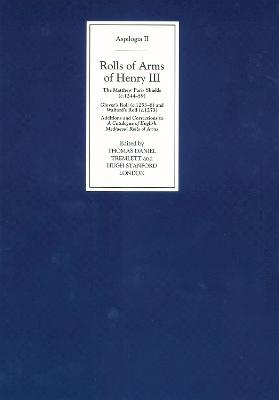
Rolls of Arms Henry III
The Matthew Paris Shields (c.1244-59); Glover's Roll (c.1253-8) and Walford's Roll (c.1273); Additions and Corrections to A Catalogue of English Mediaeval Rolls of Arms
Seiten
1958
The Boydell Press (Verlag)
978-1-84383-411-3 (ISBN)
The Boydell Press (Verlag)
978-1-84383-411-3 (ISBN)
- Titel ist leider vergriffen;
keine Neuauflage - Artikel merken
A most valuable and constructive addition to the literature of early heraldry. ENGLISH HISTORICAL REVIEW
In the thirteenth century, written records of the arms borne by knights first begin to appear, and the three manuscripts described in this volume cover perhaps one-tenth of those who might have been qualified to bear arms. It is alarge enough proportion to give a good picture of English heraldry of the period. The shields in Matthew Paris's manuscripts reflect heraldry as seen through the eyes of one of the greatest artists of the period, and have the added interest of annotations in Latin; the other two manuscripts are the earliest actual collections of English arms. They reveal an already quite elaborate system of heraldry, which has progressed from the simple shields of the twelfth century to heraldic devices which define the bearer's genealogical status, as in the markings used for cadets or younger sons. A whole vocabulary has grown up to describe the coats of arms, and this can be compared to MatthewParis's Latin. Shields are occasionally 'canting', a punning visual reference to the owner's name.
In the thirteenth century, written records of the arms borne by knights first begin to appear, and the three manuscripts described in this volume cover perhaps one-tenth of those who might have been qualified to bear arms. It is alarge enough proportion to give a good picture of English heraldry of the period. The shields in Matthew Paris's manuscripts reflect heraldry as seen through the eyes of one of the greatest artists of the period, and have the added interest of annotations in Latin; the other two manuscripts are the earliest actual collections of English arms. They reveal an already quite elaborate system of heraldry, which has progressed from the simple shields of the twelfth century to heraldic devices which define the bearer's genealogical status, as in the markings used for cadets or younger sons. A whole vocabulary has grown up to describe the coats of arms, and this can be compared to MatthewParis's Latin. Shields are occasionally 'canting', a punning visual reference to the owner's name.
| Erscheint lt. Verlag | 23.7.2009 |
|---|---|
| Reihe/Serie | Aspilogia |
| Zusatzinfo | 1 colour, 2 b/w illus. |
| Verlagsort | Woodbridge |
| Sprache | englisch |
| Maße | 178 x 254 mm |
| Themenwelt | Geschichte ► Hilfswissenschaften ► Heraldik |
| Sozialwissenschaften ► Politik / Verwaltung | |
| ISBN-10 | 1-84383-411-1 / 1843834111 |
| ISBN-13 | 978-1-84383-411-3 / 9781843834113 |
| Zustand | Neuware |
| Haben Sie eine Frage zum Produkt? |